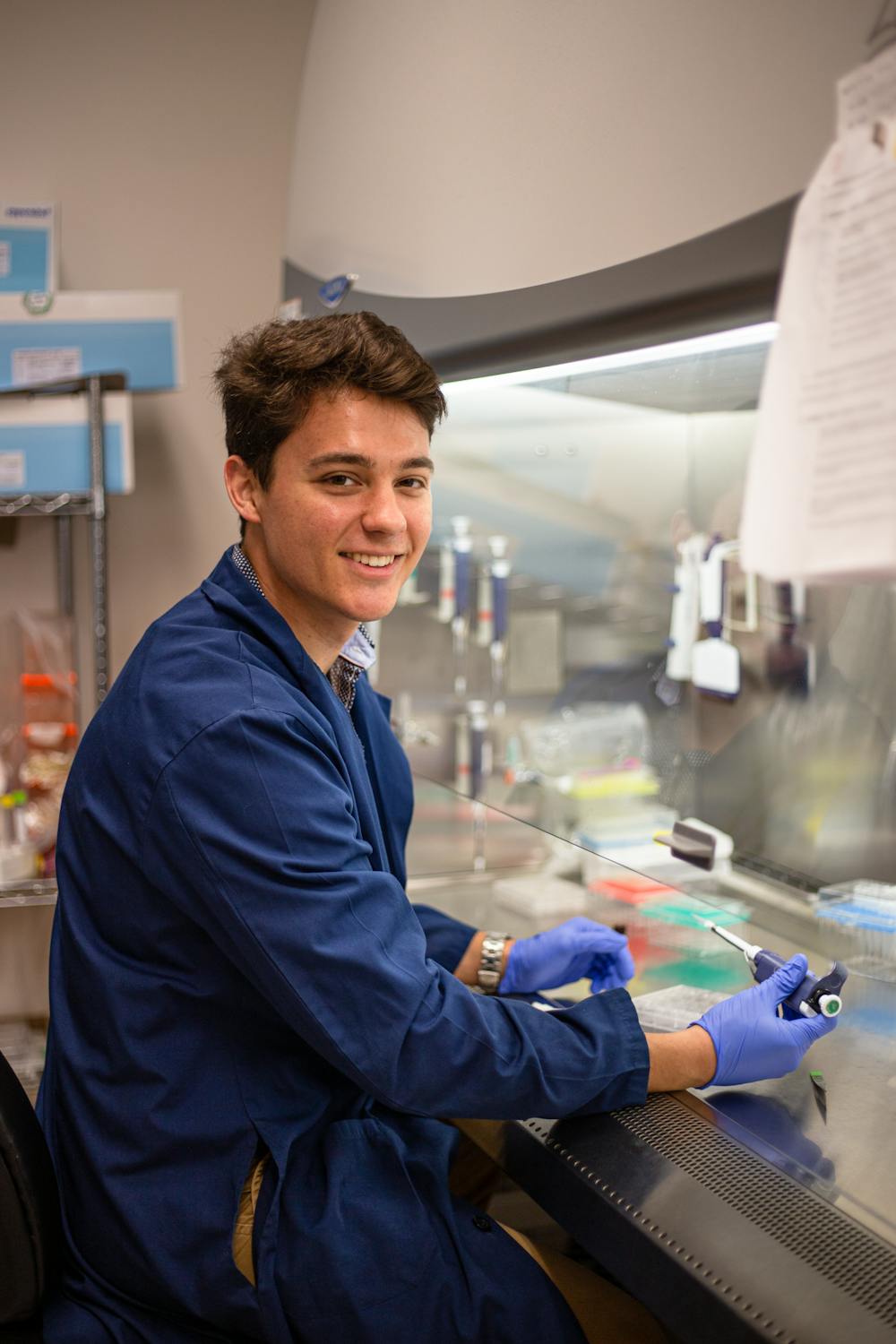Asfouri selected for Churchill Scholarship

Joseph Asfouri, a Sid Richardson College senior, was recently one of 18 U.S. college students selected as a recipient of the Churchill Scholarship at the University of Cambridge. Asfouri is now the second person in the last three decades at Rice to receive this prestigious award, according to Center for Civic Leadership Fellowship Director Danika Brown.
Asfouri, a prior recipient of the Barry Goldwater scholarship, said he is excited to continue the research he has been doing at Rice in neuroengineering. He will graduate in May with a double degree in electrical engineering and neuroscience.
Hailing from Austin, Asfouri said he knew he wanted to attend Rice because of the transformative neuroengineering work happening on campus and across the street at the Texas Medical Center. Beginning his second week of school, Asfouri joined Jacob Robinson’s neuroengineering lab at Rice. and since then he has been a part of research initiatives at Baylor College of Medicine, University of Washington and Weill Medical College at Cornell University.
“I am very fascinated with mathematics and biology alike, so I decided to pursue this intersectional neuroengineering from both directions,” Asfouri said. “Curricularly, I have followed the course requirements. But in my research, my background is taking the form of engineering in both the software and hardware side. On the hardware side has been … building devices that can interface with the nervous system. And on the software side, that takes the form of building algorithms which can make decisions on what activity or what information we read and write from and to the brain.”
Robinson, associate professor of bioengineering, said that Asfouri came into his lab freshman year with incredible talent and contributed key research findings to his lab.
“Thanks to his contributions we can now measure magnetic properties of nanoparticles at different magnetic field frequencies,” Robinson said. “Joseph is not just an exceptional young scientist, but he’s also an exceptional young man.”
Brown said that Asfouri’s commitment to ethics and integrity in his research helped him stand out as an applicant.
“I definitely think the reason he won is that he has a really clear understanding of why he is doing what he is doing,” Brown said. “And he is committed to doing that work with integrity and in an ethical fashion. He asks more than just questions about what’s next for the research, but what are the implications of the research for society? And so, he’s asking really thoughtful, important questions.”
Asfouri said he is excited to work in Europe to attain a new perspective on how scientific research interacts with industry.
“Entrepreneurship is one aspect of my career that currently I have a weakness [in], but eventually I want to pursue as a way to quickly and expediently [translate] and [commercialize] medical devices so that they can get to the clinic faster,” Asfouri said. “So that they can be commercialized safely and accessible for every section of society.”
While in Cambridge, Asfouri will be taking classes to obtain a Masters in biotechnology, while also conducting research with bioelectronics expert George Malliaris. His research focuses on designing neural devices that are less invasive and do not require surgery to implant.
“I think Cambridge, historically, is a very fascinating place,” Asfouri said. “Some of the greatest scientists of all time either studied there [or] conducted their research there. In neuroscience, specifically, there has been quite a bit of fundamental research going on there.”
Aside from his research, Asfouri also dedicated time during his undergraduate years developing FIRST at Rice, a student club that mentors K-12 robotics teams throughout East Texas with a specific focus on underprivileged areas. Asfouri said he founded this club because he developed key technical skills as a result of strong robotics mentors he had in high school.
“Giving [students] the opportunity to develop these skills will lower the barrier when they enter college,” Asfouri said. “The inequality in a city like Houston, there’s a cycle that [these students] are trapped in. And I think STEM is the gateway out of this cycle of inequality.”
Beyond FIRST, Asfouri is also a captain of the Rice Rowing Team and plays piano to decompress from academic studies. Asfouri said he enjoys seeing how his work in neuroscience relates to these extracurricular activities.
“[Playing piano] is sort of a singular task with a defined solution that I can just focus on,” Asfouri said. “I feel like when I play, I’m not the one doing it. [It’s] really the brain that remembers. [It is] muscle memory. The complexity of the motion, you wonder, what is the evolutionary reason that enables us to do this?”
More from The Rice Thresher

Rice to support Harvard in lawsuit against research funding freeze
Rice, alongside 17 other research universities, filed an amicus curiae brief in support of Harvard University’s lawsuit against the Trump administration over more than $2 billion in frozen research grants.

Mayor Whitmire discusses ‘the state of Houston’ between audience protests at Baker Institute
John Whitmire’s remarks on the city’s budget, transportation and infrastructure were interrupted twice by shouts from audience members at a Baker Institute event May 29. At the event, which was open to the public, Whitmire spoke about the current state of Houston alongside former county judge Ed Emmett.
Rice reaffirms support for international students after Trump administration targets Harvard
Rice and the Office of International Students and Scholars said in a May 23 email that they are monitoring the Trump administration’s actions towards Harvard to bar the school from enrolling international students. A federal judge temporarily halted the move less than 24 hours later.


Please note All comments are eligible for publication by The Rice Thresher.